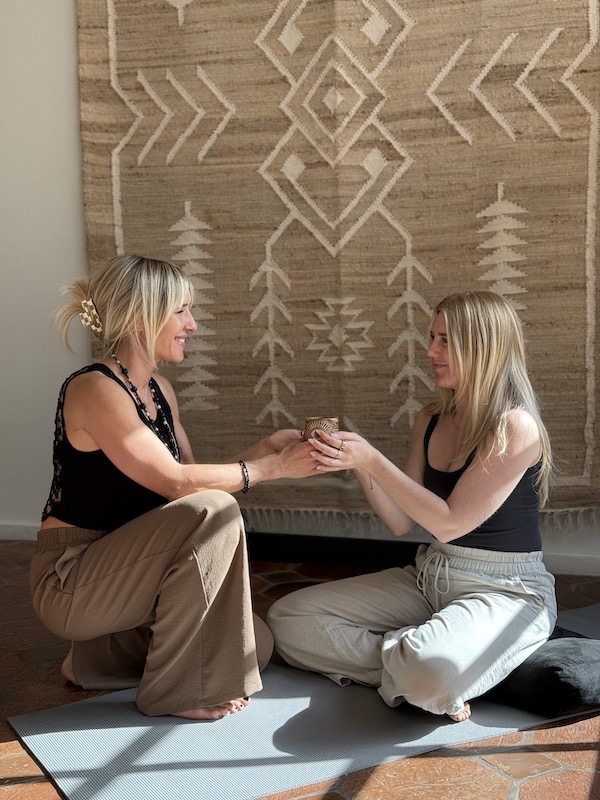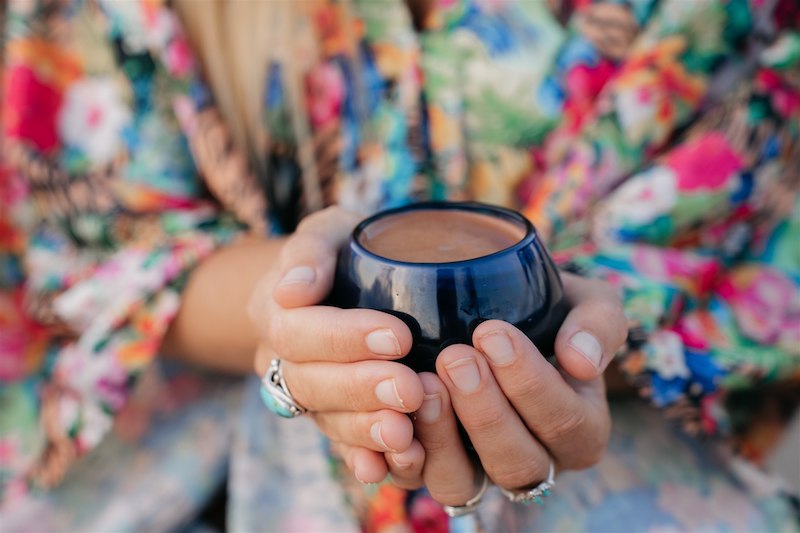BY BETH WEITZMAN
For many, cacao evokes images of indulgent chocolate bars or comforting cups of hot cocoa. While delightful, those who have experienced its deeper gifts know it as something far more profound — a powerful healing force for both body and mind. Luana “Makenzie” Marzluff, Founder of KAKAO Ceremonial Drinking Chocolate, discovered cacao’s transformative power in 2015. Her personal healing journey began with a master plant teacher called Uni (also known as Ayahuasca), along with researching plants to help elevate consciousness.
“I discovered whole bean, heirloom, ceremonial-grade cacao as a healing, yet gentle plant medicine rooted in extensive cultural history throughout Central and South America. When I received my first block of ceremonial-grade cacao, I prepared a cup and a meditative space. I felt ecstatic energy moving through my whole body, and it was a profound heart opening,” Marzluff recalls.
That experience led her to Guatemala, where she followed a trail of synchronicities and teachers until she found herself working directly with Indigenous farmers, sourcing native, heirloom cacao strains cultivated in harmony with the Earth. In 2016, she founded KAKAO to share this natural wonder with the Western world — not as a commodity, but as a ceremonial plant medicine meant for deep connection and healing “in a way that honors ancient traditions and the original custodians of this medicine,” she explains.
WHAT MAKES CACAO CEREMONIAL?
Not all cacao is the same. The definition of ceremonial-grade cacao varies, but for Marzluff, certain key qualities set true ceremonial cacao apart. “First, we are looking for the native, heirloom strains of cacao grown on lands that cacao is native to,” she explains. “For instance, we source Chuncho Cacao from Peru and Criollo Cacao from Guatemala, both of which are native strains that carry the original genetic makeup from Mother Earth, versus the hybrid and modified strains that most chocolate in the world is made from.”
Beyond sourcing, the processing method is just as crucial to maintaining cacao’s integrity. “We also use the whole cacao bean, instead of using only certain components, to preserve the integrity and full profile of all of its ceremonial and healing benefits,” she explains. Lastly, Marzluff emphasizes that true ceremonial-grade cacao “must be stone ground only, ensuring it wasn’t processed with heavy machinery, and that it is handled with intention and care at every step of the supply chain.”
ETHICAL FARMING AND REGENERATIVE SOURCING
Sustainability and ethical sourcing are central to KAKAO’s mission. “Ethical “farming” means no pesticides are used and that the cacao is grown inside a canopy of many other types of trees — making it a regenerative, soil-preserving ecosystem in alignment with nature,” says Marzluff.

She and her team work directly with growers, bypassing middlemen, co-ops, brokers, and foreignowned farms to maintain integrity in sourcing. “We partner with native families that are the original custodians of the land itself, along with indigenous tribes that honor cultural practices and Earth’s natural rhythms,” she explains. This direct partnership ensures farmers are fairly compensated for their labor and knowledge. “Our farmers and families set their own prices, versus forcing them to go through large conglomerates such as co-ops or distributors,” she adds.
CACAO AS NUTRITIONAL AND EMOTIONAL MEDICINE
While often recognized for its antioxidant content, ceremonial cacao offers a wealth of benefits that go far beyond basic nutrition. Marzluff explains, “Whole bean, native cacao is high in many amazing compounds that benefit one physically, mentally, emotionally, and spiritually. To name a few: tryptophan (a precursor to serotonin), magnesium, phylelethylamine (a compound that elicits feelings of love and connection), theobromine (a vasodilator that helps pump more oxygen to the brain, supplying natural energy, focus, and creative impulses without the crash that comes from caffeine), and anandamine (known as the “bliss molecule”).”
In addition to its moodenhancing properties, cacao also supports overall wellbeing. “The high magnesium content in cacao supports digestion, lowers stress, and reduces pain and inflammation,” she adds.
These naturally occurring compounds are believed to support stress relief, cardiovascular health, cognitive function, and emotional balance, making ceremonial cacao a potentially powerful tool for both physical and energetic well-being. However, not all cacao retains these benefits.
“Processed chocolate is made from hybridized and genetically altered cacao that won’t be as high in these compounds and will actually be much higher in caffeine instead, which is harmful to the nervous system,” Marzluff explains. “Furthermore it is typically mixed with a lot of processed dairy and sugar, ultimately eliminating any potential benefit. To experience the true benefits of cacao, we need to make sure it is native, whole bean, stone ground, and kept in its natural form without harmful additives,” she explains.

According to Marzluff, “People that replace their coffee with KAKAO find it to be incredibly healing for their nervous system, lowering their anxiety or getting rid of it altogether, and also uplifting overall creativity, mental clarity, and sense of connection.” She continues, “Ceremonial cacao is one of the richest sources of antioxidants and flavonoids, which improves the body’s circulation and immune system, helps protect the body from oxidative stress, and reduces inflammation.”
This holistic approach to well-being is what drew Katie Anderson, a holistic self-love coach from Gilbert, Arizona, to ceremonial cacao. After her own life-changing experiences with plant medicines, Anderson began facilitating cacao ceremonies for her clients, integrating the natural medicine into her work.
“Cacao is gentle, like a hug in a cup,” Anderson says. “It is a vasodilator, meaning it increases blood flow and circulation, producing a warm feeling and a gentle rise in heart rate. This enhanced circulation increases vitality and promotes the flow of energy. The heart chakra is our energy center of love and emotional balance.”
CACAO AND THE HEART CHAKRA
Both Marzluff and Anderson emphasize cacao’s unique relationship with the heart chakra, the energetic center of love, vulnerability, and connection. In Indigenous traditions, cacao is understood to have a feminine spirit — one that gently dissolves the walls we build around our hearts.
Anderson describes how cacao supports emotional healing. “Cacao is also mood-boosting and supports emotional openness, introspection, and emotional release. It enhances compassion and awareness, increasing our connection to ourselves and to others. Through Cacao, we experience a greater sense of self-love, compassion, and love for all. Love — both for ourselves and others — creates a space of acceptance, where we can truly see and be seen for who we are.”
“The spirit of cacao is a feminine spirit that must be viscerally and personally experienced to fully understand the truth of her teachings,” says Marzluff. “People all over the world give credit to cacao for helping them heal their hearts and re-open their hearts to life, to others, and to their higher purpose.”
A TOOL FOR EVERYDAY RITUAL
While cacao ceremonies can be beautifully elaborate, Anderson encourages her clients to start simply. “Each person’s journey with plant medicine is unique, and every ceremony is shaped by the individual and their intention,” she explains. “The medicine works through the body in its own way, guiding each person to what they need most.”
Marzluff suggests, “When you drink cacao, you can say a prayer for something specific or simply ask ‘her’ to open your heart. You can play soothing music, meditate, dance, walk/sit in nature, journal, or have a heart-to-heart conversation that is deeper than the surface level to cultivate more intimacy in your life and relationships.” The key is treating cacao as a relationship, not a product — something both Anderson and Marzluff hold sacred.
BEYOND WELLNESS TRENDS
As cacao becomes more popular in wellness spaces, both women are committed to preserving its cultural integrity. KAKAO’s non-profit model ensures profits f low back into preserving native cacao strains and supporting Indigenous communities.

“I started KAKAO as a passion project, from a deep place within my heart to benefit others and the Earth. I never wanted KAKAO to be something I did for money per se, but rather for service to humanity,” explains Marzluff. For those drawn to the heart-opening path of cacao, Anderson’s perspective offers guidance.
“I believe that we are multidimensional beings, where the physical and spiritual are deeply interconnected. Plant medicines work to heal the body, mind, emotions, and energetic body, bringing balance and harmony on every level.”
To learn more, visit www.flykakao.com and follow Katie Anderson on Instagram at @katiestylez.






